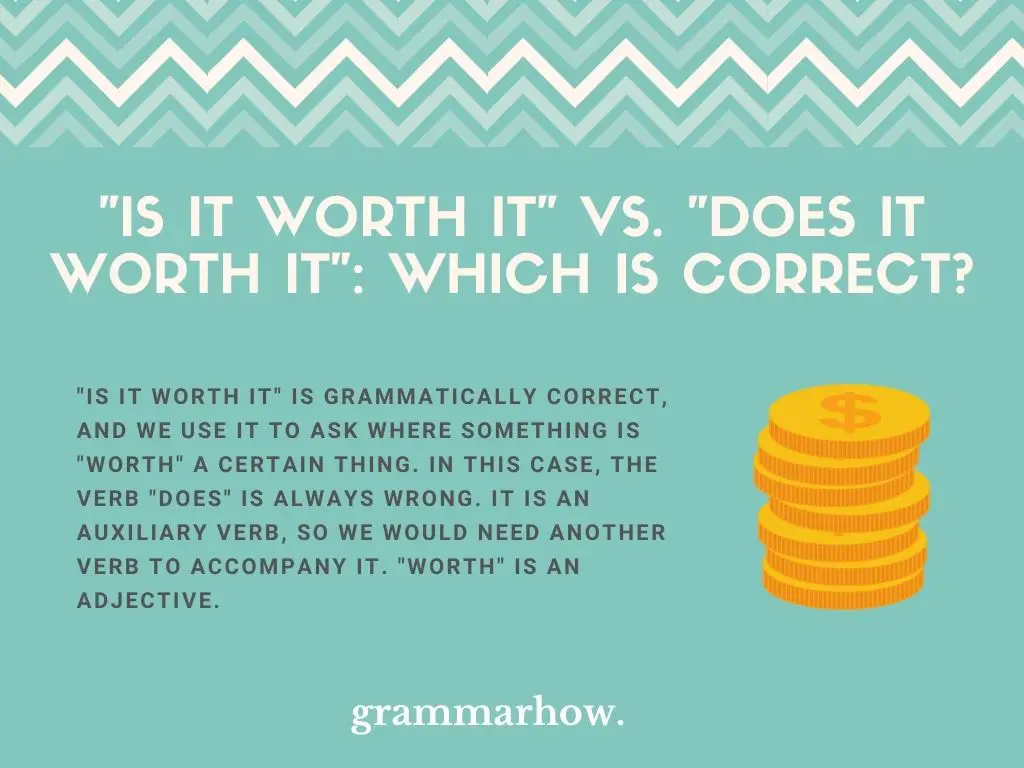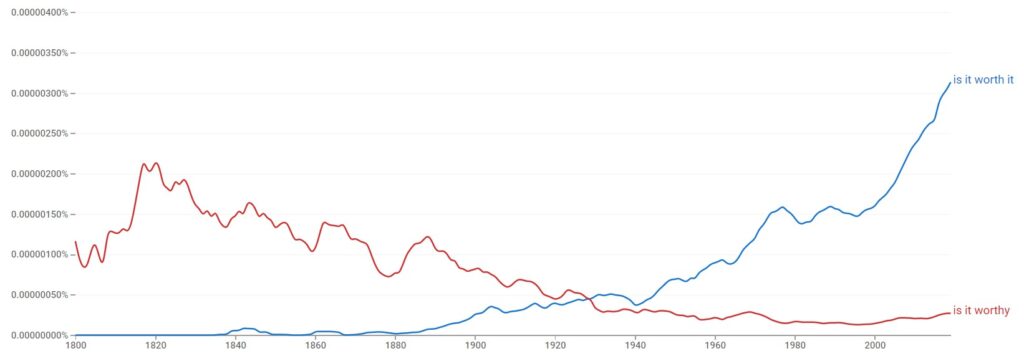The phrases “is it worth it” and “does it worth it” both seem to follow the same rules. However, only one of these phrases is correct, while the other you should never use the other. This article will explain which one is better to use and why.
“Is It Worth It” Vs. “Does It Worth It”: Which Is Correct?
“Is it worth it” is grammatically correct, and we use it to ask where something is “worth” a certain thing. In this case, the verb “does” is always wrong. It is an auxiliary verb, so we would need another verb to accompany it. “Worth” is an adjective.

Using “worth” in this sentence means it’s an adjective. We’re looking to define the exact “worth” of something. “Is” is the correct verb form to use because it asks a question of the value of something.
What Does “Is It Worth It” Mean?
“Is it worth it” means we’re asking whether something is worth doing. That means we’re comparing the risks of the thing we want to do to the advantages to see whether there’s enough value in doing it.
The definition of “worth,” according to The Cambridge Dictionary, is “enjoyable enough or producing enough advantages to make the necessary effort, risk, pain, etc., seem acceptable.”
We can also use the phrase “you are worth it” to mean something similar. In this case, we’re talking about someone’s personal “worth” being acceptable.
“You are worth it” means that we value the importance or enjoyability of somebody enough compared to the disadvantages that might come along with them. It’s something you would say to your romantic partner more than anyone else.
Examples Of How To Use “Is It Worth It” In A Sentence
Let’s go over using “is it worth it” in a sentence. Sometimes, the adjective “worth” relates to monetary value, while other times, we might be able to talk about the actually physical enjoyment of something.
To help you understand what we mean, these examples will explore both of those definitions.
- I like this phone, but is it worth the price?
- I don’t understand this. Is it really worth it to order this when there are so many other options?
- Is this worth it? It looks good, but I feel like it’s too expensive.
- You are worth it to me, and I won’t quit until you see that!
- Is it worth it for me to participate in these events? I’ll feel like I’ll just keep losing.
- Is this worth it because I’m not having any fun at the minute!
- None of this is worth it. I’m done trying to impress you.
As you can see, there are a few variations of “is it worth it.” We can replace the first two words to become a statement “it is worth it” rather than a question.
“It is worth it” is a statement we can make to say that something is already worth putting time, effort, or money into. If we’ve evaluated the risk versus rewards, then something is “worth it” when we don’t mind the risks.
Is It Correct To Use “Is It Worth”?
“Is it worth” is incorrect. It’s an incomplete sentence that needs an extra word or two before it works.
The adjective “worth” needs something to describe. The point of an adjective is to modify a noun in a sentence, so without anything coming after “worth,” we’re left with an incomplete sentence.
Here’s what we mean:
- Is it worth it? (“It” is the noun)
- Is it worth the money? (“They money” is the noun)
- Is it worth my time? (“My time” is the noun)
It doesn’t matter what noun you put after “worth,” but there does have to be one there. Without it, you’ll find that “is it worth” never makes sense.
Should I Use “Is It Worth It” Or “Is It Worthy”?
“Worthy” is another adjective that’s similar to “worth.” However, we use it in a much different sense.
You should use “is it worth it” rather than “is it worthy.” “Is it worth it” talks about whether something is worth our effort, while “is it worthy” asks whether something deserves our respect.
According to this graph, it’s obvious that “is it worth it” is the more common phrase in English. “Is it worthy” does sometimes get used, but the situations where it’s relevant are much less common to come across.

Historically, “is it worthy” was the more popular choice, but in the 1920s, “worth it” took over in popularity. Now, “worthy” is seen as an archaic word that very rarely sees any relevance in modern English.
Is It Ever Correct To Use “Is It Worthed It”?
“Is it worthed it” is never correct. The suffix “-ed” applies to past tense verbs. However, “worth” is an adjective and not a verb, therefore making it impossible to use “is it worthed it” correctly.
Worth It – Synonyms
Let’s check out some synonyms for saying “worth it.” You might find one of these slightly more useful to you, especially if you don’t really understand the adjective form of “worth it.”
- Worthwhile
- Desirable
- Profitable
- Useful
- Valuable
- Beneficial
- Constructive
- Meaningful
- Productive
All of these words are great synonyms for “worth it.” We can also ask “is it” as a question before any of these words to value whether we think something is important enough to spend our time or money on it.
How Do You Say “Worth It” Professionally?
Finally, you’ll be better off avoiding using “worth it” professionally. It’s not the most formal phrase to use, so you should find a more suitable alternative.
You should say “is it profitable” or “is it constructive” if you’re trying to ask your boss or a colleague whether something is “worth it.” They’re more professional terms (especially in a business sense).
- Do you have any ideas of what we can do with this assignment?
- Yes, boss. I’ve asked around to see whether it is profitable and found that many people agree.
- Is there anything you can report back?
- Yes, it was constructive to come up with these reports.
You may also like:
It Is Worth It vs. It Is Worthy – What’s the Difference?
“It Worths It” or It Worth It” or “It Is Worth It”?

Martin holds a Master’s degree in Finance and International Business. He has six years of experience in professional communication with clients, executives, and colleagues. Furthermore, he has teaching experience from Aarhus University. Martin has been featured as an expert in communication and teaching on Forbes and Shopify. Read more about Martin here.
